#and so is a lot of microsoft software
Explore tagged Tumblr posts
Text
IIRC the Mac versions of Microsoft Office actually function better than the Windows ones. I suspect this is partially because Apple has its own proprietary version of the Office suite that you can download for free if you are running OSX, so Microsoft Office has to work really hard to be able to compete.
I say partially though because the performance of Microsoft Office software on Macs has always been better in my recollection, even before the iWork suite was a thing. Word 2004 on the old-timey rainbow iMacs and battered Macbooks at my elementary school ran smoother, with much quicker saving and less crashes, than Word 2003 on the XP I had at home. Word 2007 was even more laggy, and this was despite my parents buying a custom Vista to ensure that all the hardware was suitable for the then-new OS (bad communication at launch from Microsoft meant that a lot of retailers were selling computers with Vista installed that had no business running anything newer than XP. My parents made sure that our Vista did not have this problem.).
Vista was the last Microsoft computer my family invested in, but from my experiences at libraries and places like that, I've been disappointed in how little has changed. I mean, that's not to say that nothing has changed at all-- Word 2023 doesn't crash like Word 2007 (which makes it much less anxiety-provoking to use!), and Excel has made leaps and strides towards better functionality when it comes to complicated math and data analysis. But across the board, the performance of Microsoft Office is still noticeably worse on Windows than Mac.
I mean, lack of competition is one hell of a drug but the performance gap between Microsoft Office on Windows and on Mac has been around since before Apple started trying to compete with Microsoft Office. Microsoft Windows is consistently the worst OS to run Microsoft products on and it's just so... baffling. If you love Microsoft software (and have a pool full of gold coins to swim in), buy a Mac. The software will work better.

#not kidding about the pool of gold coins though#macs are expensive#and so is a lot of microsoft software#frustration#absurdity#apple#osx#microsoft#windows
70K notes
·
View notes
Text
am having the weirdest issue w/ this dvd i bought online, where like, it plays but the video is deeply fucked up and jerky/skipping therefore unsyncing it from the audio (which is fine). BUT. only on the xbox. i found one single solitary review saying it ended up working fine on a regular dvd player and lo and behold, tried it on my dad's laptop and it's true! How? Why? Who Fucking Knows! Now i gotta go dig our fucking oldass dvd player outta basement storage bc lord knows neither my new laptop nor my old laptop has one -_-
it's fuckin weird, tho, right? Like, there were other amazon reviews mentioning the issue but just the one about the xbox vs dvd drive thing, and there were def other ppl positively reviewing the dvd itself and not just the movie (they mentioned the extra features). i also kept finding one-off comments on various reddit threads that mention the issue but never any resolution. i even logged on to facebook (gag) on my computer and scrolled alllllll the way back to 2017/2018 on the movie's official fb page and again. just the occasional comment about the issue and like 1 single reply on 1 comment mentioning the xbox thing ://///
#also its just. not a gr8 quality dvd? its NOT a bootleg but u could be forgiven 4 thinking so based on packaging#and the video is a lot more grainy than when i watched on streaming. AND theres no captions !!!! unforgivable imho#it shouldnt be a region issue bc wouldnt it just. not play then? plus its an american release anyways#im very annoyed tbh and i want a replacement not a refund but it doesnt give me that option on amazon.....#the aforementioned fb comment reply said that updating the xbox's firmware/software might resolve the issue#but we already have ours set to update automatically so it Should be up to date anyways......#ah well. literally only bought it bc of extra scenes/bts stuff but still :( be nice 2 not have 2 find and set up a whole nother device.....#ended up buying a digital copy plus the 2 others in the trilogy since they didnt even get physical releases.....#blegh. hate this digital movie library shit. i dont even know the signin for the microsoft account bc its a shared console!#i DID see some1 online say that they ripped the dvd and could then play THAT on the xbox but that is. beyond my limited knowledge#bro i dont even buy blurays idk wtf im doing here#the fb page does still seem 2 be updating abt recent projects but the website isnt up any longer so. 🤷#its not a Big Name Movie ig they have outright said on the fb page that eg. they couldnt afford 2 also do a bluray release or smth idek#this whole thing is baffling honestly
2 notes
·
View notes
Text
Since the whole thing with NaNoWriMo has gone down, I've noticed that one of their former sponsors, Ellipsus, has cut contact with NaNoWriMo because they do not support their stance on AI; I didn't know what Ellipsus was, but upon further research I've found that they are a writing platform that works a lot like Google Docs and Microsoft Word, only with a heavier leaning on the story-writing aspect and connecting with other writers - and they also completely denounce any use of AI, both in the writing process itself and in the use of their platform. I really appreciate that.
Since this is the case (and since I've noticed Google has begun implementing more AI into their software), I've decided to give Ellipsus a try to see if it's a good alternative to Google Docs (my main writing platform). It's completely free and so far, I've found it simple to use (although it is pretty minimal in its features), and I really like the look of it.
I figured I'd spread the word about this platform in case any of you writers would want to give it a try, and if you do, let me know how you like it!
44K notes
·
View notes
Text
“Disenshittify or Die”
youtube
I'm coming to BURNING MAN! On TUESDAY (Aug 27) at 1PM, I'm giving a talk called "DISENSHITTIFY OR DIE!" at PALENQUE NORTE (7&E). On WEDNESDAY (Aug 28) at NOON, I'm doing a "Talking Caterpillar" Q&A at LIMINAL LABS (830&C).

Last weekend, I traveled to Las Vegas for Defcon 32, where I had the immense privilege of giving a solo talk on Track 1, entitled "Disenshittify or die! How hackers can seize the means of computation and build a new, good internet that is hardened against our asshole bosses' insatiable horniness for enshittification":
https://info.defcon.org/event/?id=54861
This was a followup to last year's talk, "An Audacious Plan to Halt the Internet's Enshittification," a talk that kicked off a lot of international interest in my analysis of platform decay ("enshittification"):
https://www.youtube.com/watch?v=rimtaSgGz_4
The Defcon organizers have earned a restful week or two, and that means that the video of my talk hasn't yet been posted to Defcon's Youtube channel, so in the meantime, I thought I'd post a lightly edited version of my speech crib. If you're headed to Burning Man, you can hear me reprise this talk at Palenque Norte (7&E); I'm kicking off their lecture series on Tuesday, Aug 27 at 1PM.
==
What the fuck happened to the old, good internet?
I mean, sure, our bosses were a little surveillance-happy, and they were usually up for sharing their data with the NSA, and whenever there was a tossup between user security and growth, it was always YOLO time.
But Google Search used to work. Facebook used to show you posts from people you followed. Uber used to be cheaper than a taxi and pay the driver more than a cabbie made. Amazon used to sell products, not Shein-grade self-destructing dropshipped garbage from all-consonant brands. Apple used to defend your privacy, rather than spying on you with your no-modifications-allowed Iphone.
There was a time when you searching for an album on Spotify would get you that album – not a playlist of insipid AI-generated covers with the same name and art.
Microsoft used to sell you software – sure, it was buggy – but now they just let you access apps in the cloud, so they can watch how you use those apps and strip the features you use the most out of the basic tier and turn them into an upcharge.
What – and I cannot stress this enough – the fuck happened?!
I’m talking about enshittification.
Here’s what enshittification looks like from the outside: First, you see a company that’s being good to its end users. Google puts the best search results at the top; Facebook shows you a feed of posts from people and groups you followl; Uber charges small dollars for a cab; Amazon subsidizes goods and returns and shipping and puts the best match for your product search at the top of the page.
That’s stage one, being good to end users. But there’s another part of this stage, call it stage 1a). That’s figuring out how to lock in those users.
There’s so many ways to lock in users.
If you’re Facebook, the users do it for you. You joined Facebook because there were people there you wanted to hang out with, and other people joined Facebook to hang out with you.
That’s the old “network effects” in action, and with network effects come “the collective action problem." Because you love your friends, but goddamn are they a pain in the ass! You all agree that FB sucks, sure, but can you all agree on when it’s time to leave?
No way.
Can you agree on where to go next?
Hell no.
You’re there because that’s where the support group for your rare disease hangs out, and your bestie is there because that’s where they talk with the people in the country they moved away from, then there’s that friend who coordinates their kid’s little league car pools on FB, and the best dungeon master you know isn’t gonna leave FB because that’s where her customers are.
So you’re stuck, because even though FB use comes at a high cost – your privacy, your dignity and your sanity – that’s still less than the switching cost you’d have to bear if you left: namely, all those friends who have taken you hostage, and whom you are holding hostage
Now, sometimes companies lock you in with money, like Amazon getting you to prepay for a year’s shipping with Prime, or to buy your Audible books on a monthly subscription, which virtually guarantees that every shopping search will start on Amazon, after all, you’ve already paid for it.
Sometimes, they lock you in with DRM, like HP selling you a printer with four ink cartridges filled with fluid that retails for more than $10,000/gallon, and using DRM to stop you from refilling any of those ink carts or using a third-party cartridge. So when one cart runs dry, you have to refill it or throw away your investment in the remaining three cartridges and the printer itself.
Sometimes, it’s a grab bag:
You can’t run your Ios apps without Apple hardware;
you can’t run your Apple music, books and movies on anything except an Ios app;
your iPhone uses parts pairing – DRM handshakes between replacement parts and the main system – so you can’t use third-party parts to fix it; and
every OEM iPhone part has a microscopic Apple logo engraved on it, so Apple can demand that the US Customs and Border Service seize any shipment of refurb Iphone parts as trademark violations.
Think Different, amirite?
Getting you locked in completes phase one of the enshittification cycle and signals the start of phase two: making things worse for you to make things better for business customers.
For example, a platform might poison its search results, like Google selling more and more of its results pages to ads that are identified with lighter and lighter tinier and tinier type.
Or Amazon selling off search results and calling it an “ad” business. They make $38b/year on this scam. The first result for your search is, on average, 29% more expensive than the best match for your search. The first row is 25% more expensive than the best match. On average, the best match for your search is likely to be found seventeen places down on the results page.
Other platforms sell off your feed, like Facebook, which started off showing you the things you asked to see, but now the quantum of content from the people you follow has dwindled to a homeopathic residue, leaving a void that Facebook fills with things that people pay to show you: boosted posts from publishers you haven’t subscribed to, and, of course, ads.
Now at this point you might be thinking ‘sure, if you’re not paying for the product, you’re the product.'
Bullshit!
Bull.
Shit.
The people who buy those Google ads? They pay more every year for worse ad-targeting and more ad-fraud
Those publishers paying to nonconsensually cram their content into your Facebook feed? They have to do that because FB suppresses their ability to reach the people who actually subscribed to them
The Amazon sellers with the best match for your query have to outbid everyone else just to show up on the first page of results. It costs so much to sell on Amazon that between 45-51% of every dollar an independent seller brings in has to be kicked up to Don Bezos and the Amazon crime family. Those sellers don’t have the kind of margins that let them pay 51% They have to raise prices in order to avoid losing money on every sale.
"But wait!" I hear you say!
[Come on, say it!]
"But wait! Things on Amazon aren’t more expensive that things at Target, or Walmart, or at a mom and pop store, or direct from the manufacturer.
"How can sellers be raising prices on Amazon if the price at Amazon is the same as at is everywhere else?"
[Any guesses?!]
That’s right, they charge more everywhere. They have to. Amazon binds its sellers to a policy called “most favored nation status,” which says they can’t charge more on Amazon than they charge elsewhere, including direct from their own factory store.
So every seller that wants to sell on Amazon has to raise their prices everywhere else.
Now, these sellers are Amazon’s best customers. They’re paying for the product, and they’re still getting screwed.
Paying for the product doesn’t fill your vapid boss’s shriveled heart with so much joy that he decides to stop trying to think of ways to fuck you over.
Look at Apple. Remember when Apple offered every Ios user a one-click opt out for app-based surveillance? And 96% of users clicked that box?
(The other four percent were either drunk or Facebook employees or drunk Facebook employees.)
That cost Facebook at least ten billion dollars per year in lost surveillance revenue?
I mean, you love to see it.
But did you know that at the same time Apple started spying on Ios users in the same way that Facebook had been, for surveillance data to use to target users for its competing advertising product?
Your Iphone isn’t an ad-supported gimme. You paid a thousand fucking dollars for that distraction rectangle in your pocket, and you’re still the product. What’s more, Apple has rigged Ios so that you can’t mod the OS to block its spying.
If you’re not not paying for the product, you’re the product, and if you are paying for the product, you’re still the product.
Just ask the farmers who are expected to swap parts into their own busted half-million dollar, mission-critical tractors, but can’t actually use those parts until a technician charges them $200 to drive out to the farm and type a parts pairing unlock code into their console.
John Deere’s not giving away tractors. Give John Deere a half mil for a tractor and you will be the product.
Please, my brothers and sisters in Christ. Please! Stop saying ‘if you’re not paying for the product, you’re the product.’
OK, OK, so that’s phase two of enshittification.
Phase one: be good to users while locking them in.
Phase two: screw the users a little to you can good to business customers while locking them in.
Phase three: screw everybody and take all the value for yourself. Leave behind the absolute bare minimum of utility so that everyone stays locked into your pile of shit.
Enshittification: a tragedy in three acts.
That’s what enshittification looks like from the outside, but what’s going on inside the company? What is the pathological mechanism? What sci-fi entropy ray converts the excellent and useful service into a pile of shit?
That mechanism is called twiddling. Twiddling is when someone alters the back end of a service to change how its business operates, changing prices, costs, search ranking, recommendation criteria and other foundational aspects of the system.
Digital platforms are a twiddler’s utopia. A grocer would need an army of teenagers with pricing guns on rollerblades to reprice everything in the building when someone arrives who’s extra hungry.
Whereas the McDonald’s Investments portfolio company Plexure advertises that it can use surveillance data to predict when an app user has just gotten paid so the seller can tack an extra couple bucks onto the price of their breakfast sandwich.
And of course, as the prophet William Gibson warned us, ‘cyberspace is everting.' With digital shelf tags, grocers can change prices whenever they feel like, like the grocers in Norway, whose e-ink shelf tags change the prices 2,000 times per day.
Every Uber driver is offered a different wage for every job. If a driver has been picky lately, the job pays more. But if the driver has been desperate enough to grab every ride the app offers, the pay goes down, and down, and down.
The law professor Veena Dubal calls this ‘algorithmic wage discrimination.' It’s a prime example of twiddling.
Every youtuber knows what it’s like to be twiddled. You work for weeks or months, spend thousands of dollars to make a video, then the algorithm decides that no one – not your own subscribers, not searchers who type in the exact name of your video – will see it.
Why? Who knows? The algorithm’s rules are not public.
Because content moderation is the last redoubt of security through obscurit: they can’t tell you what the como algorithm is downranking because then you’d cheat.
Youtube is the kind of shitty boss who docks every paycheck for all the rules you’ve broken, but won’t tell you what those rules were, lest you figure out how to break those rules next time without your boss catching you.
Twiddling can also work in some users’ favor, of course. Sometimes platforms twiddle to make things better for end users or business customers.
For example, Emily Baker-White from Forbes revealed the existence of a back-end feature that Tiktok’s management can access they call the “heating tool.”
When a manager applies the heating toll to a performer’s account, that performer’s videos are thrust into the feeds of millions of users, without regard to whether the recommendation algorithm predicts they will enjoy that video.
Why would they do this? Well, here’s an analogy from my boyhood I used to go to this traveling fair that would come to Toronto at the end of every summer, the Canadian National Exhibition. If you’ve been to a fair like the Ex, you know that you can always spot some guy lugging around a comedically huge teddy bear.
Nominally, you win that teddy bear by throwing five balls in a peach-basket, but to a first approximation, no one has ever gotten five balls to stay in that peach-basket.
That guy “won” the teddy bear when a carny on the midway singled him out and said, "fella, I like your face. Tell you what I’m gonna do: You get just one ball in the basket and I’ll give you this keychain, and if you amass two keychains, I’ll let you trade them in for one of these galactic-scale teddy-bears."
That’s how the guy got his teddy bear, which he now has to drag up and down the midway for the rest of the day.
Why the hell did that carny give away the teddy bear? Because it turns the guy into a walking billboard for the midway games. If that dopey-looking Judas Goat can get five balls into a peach basket, then so can you.
Except you can’t.
Tiktok’s heating tool is a way to give away tactical giant teddy bears. When someone in the TikTok brain trust decides they need more sports bros on the platform, they pick one bro out at random and make him king for the day, heating the shit out of his account.
That guy gets a bazillion views and he starts running around on all the sports bro forums trumpeting his success: *I am the Louis Pasteur of sports bro influencers!"
The other sports bros pile in and start retooling to make content that conforms to the idiosyncratic Tiktok format. When they fail to get giant teddy bears of their own, they assume that it’s because they’re doing Tiktok wrong, because they don’t know about the heating tool.
But then comes the day when the TikTok Star Chamber decides they need to lure in more astrologers, so they take the heat off that one lucky sports bro, and start heating up some lucky astrologer.
Giant teddy bears are all over the place: those Uber drivers who were boasting to the NYT ten years ago about earning $50/hour? The Substackers who were rolling in dough? Joe Rogan and his hundred million dollar Spotify payout? Those people are all the proud owners of giant teddy bears, and they’re a steal.
Because every dollar they get from the platform turns into five dollars worth of free labor from suckers who think they just internetting wrong.
Giant teddy bears are just one way of twiddling. Platforms can play games with every part of their business logic, in highly automated ways, that allows them to quickly and efficiently siphon value from end users to business customers and back again, hiding the pea in a shell game conducted at machine speeds, until they’ve got everyone so turned around that they take all the value for themselves.
That’s the how: How the platforms do the trick where they are good to users, then lock users in, then maltreat users to be good to business customers, then lock in those business customers, then take all the value for themselves.
So now we know what is happening, and how it is happening, all that’s left is why it’s happening.
Now, on the one hand, the why is pretty obvious. The less value that end-users and business customers capture, the more value there is left to divide up among the shareholders and the executives.
That’s why, but it doesn’t tell you why now. Companies could have done this shit at any time in the past 20 years, but they didn’t. Or at least, the successful ones didn’t. The ones that turned themselves into piles of shit got treated like piles of shit. We avoided them and they died.
Remember Myspace? Yahoo Search? Livejournal? Sure, they’re still serving some kind of AI slop or programmatic ad junk if you hit those domains, but they’re gone.
And there’s the clue: It used to be that if you enshittified your product, bad things happened to your company. Now, there are no consequences for enshittification, so everyone’s doing it.
Let’s break that down: What stops a company from enshittifying?
There are four forces that discipline tech companies. The first one is, obviously, competition.
If your customers find it easy to leave, then you have to worry about them leaving
Many factors can contribute to how hard or easy it is to depart a platform, like the network effects that Facebook has going for it. But the most important factor is whether there is anywhere to go.
Back in 2012, Facebook bought Insta for a billion dollars. That may seem like chump-change in these days of eleven-digit Big Tech acquisitions, but that was a big sum in those innocent days, and it was an especially big sum to pay for Insta. The company only had 13 employees, and a mere 25 million registered users.
But what mattered to Zuckerberg wasn’t how many users Insta had, it was where those users came from.
[Does anyone know where those Insta users came from?]
That’s right, they left Facebook and joined Insta. They were sick of FB, even though they liked the people there, they hated creepy Zuck, they hated the platform, so they left and they didn’t come back.
So Zuck spent a cool billion to recapture them, A fact he put in writing in a midnight email to CFO David Ebersman, explaining that he was paying over the odds for Insta because his users hated him, and loved Insta. So even if they quit Facebook (the platform), they would still be captured Facebook (the company).
Now, on paper, Zuck’s Instagram acquisition is illegal, but normally, that would be hard to stop, because you’d have to prove that he bought Insta with the intention of curtailing competition.
But in this case, Zuck tripped over his own dick: he put it in writing.
But Obama’s DoJ and FTC just let that one slide, following the pro-monopoly policies of Reagan, Bush I, Clinton and Bush II, and setting an example that Trump would follow, greenlighting gigamergers like the catastrophic, incestuous Warner-Discovery marriage.
Indeed, for 40 years, starting with Carter, and accelerating through Reagan, the US has encouraged monopoly formation, as an official policy, on the grounds that monopolies are “efficient.”
If everyone is using Google Search, that’s something we should celebrate. It means they’ve got the very best search and wouldn’t it be perverse to spend public funds to punish them for making the best product?
But as we all know, Google didn’t maintain search dominance by being best. They did it by paying bribes. More than 20 billion per year to Apple alone to be the default Ios search, plus billions more to Samsung, Mozilla, and anyone else making a product or service with a search-box on it, ensuring that you never stumble on a search engine that’s better than theirs.
Which, in turn, ensured that no one smart invested big in rival search engines, even if they were visibly, obviously superior. Why bother making something better if Google’s buying up all the market oxygen before it can kindle your product to life?
Facebook, Google, Microsoft, Amazon – they’re not “making things” companies, they’re “buying things” companies, taking advantage of official tolerance for anticompetitive acquisitions, predatory pricing, market distorting exclusivity deals and other acts specifically prohibited by existing antitrust law.
Their goal is to become too big to fail, because that makes them too big to jail, and that means they can be too big to care.
Which is why Google Search is a pile of shit and everything on Amazon is dropshipped garbage that instantly disintegrates in a cloud of offgassed volatile organic compounds when you open the box.
Once companies no longer fear losing your business to a competitor, it’s much easier for them to treat you badly, because what’re you gonna do?
Remember Lily Tomlin as Ernestine the AT&T operator in those old SNL sketches? “We don’t care. We don’t have to. We’re the phone company.”
Competition is the first force that serves to discipline companies and the enshittificatory impulses of their leadership, and we just stopped enforcing competition law.
It takes a special kind of smooth-brained asshole – that is, an establishment economist – to insist that the collapse of every industry from eyeglasses to vitamin C into a cartel of five or fewer companies has nothing to do with policies that officially encouraged monopolization.
It’s like we used to put down rat poison and we didn’t have a rat problem. Then these dickheads convinced us that rats were good for us and we stopped putting down rat poison, and now rats are gnawing our faces off and they’re all running around saying, "Who’s to say where all these rats came from? Maybe it was that we stopped putting down poison, but maybe it’s just the Time of the Rats. The Great Forces of History bearing down on this moment to multiply rats beyond all measure!"
Antitrust didn’t slip down that staircase and fall spine-first on that stiletto: they stabbed it in the back and then they pushed it.
And when they killed antitrust, they also killed regulation, the second force that disciplines companies. Regulation is possible, but only when the regulator is more powerful than the regulated entities. When a company is bigger than the government, it gets damned hard to credibly threaten to punish that company, no matter what its sins.
That’s what protected IBM for all those years when it had its boot on the throat of the American tech sector. Do you know, the DOJ fought to break up IBM in the courts from 1970-1982, and that every year, for 12 consecutive years, IBM spent more on lawyers to fight the USG than the DOJ Antitrust Division spent on all the lawyers fighting every antitrust case in the entire USA?
IBM outspent Uncle Sam for 12 years. People called it “Antitrust’s Vietnam.” All that money paid off, because by 1982, the president was Ronald Reagan, a man whose official policy was that monopolies were “efficient." So he dropped the case, and Big Blue wriggled off the hook.
It’s hard to regulate a monopolist, and it’s hard to regulate a cartel. When a sector is composed of hundreds of competing companies, they compete. They genuinely fight with one another, trying to poach each others’ customers and workers. They are at each others’ throats.
It’s hard enough for a couple hundred executives to agree on anything. But when they’re legitimately competing with one another, really obsessing about how to eat each others’ lunches, they can’t agree on anything.
The instant one of them goes to their regulator with some bullshit story, about how it’s impossible to have a decent search engine without fine-grained commercial surveillance; or how it’s impossible to have a secure and easy to use mobile device without a total veto over which software can run on it; or how it’s impossible to administer an ISP’s network unless you can slow down connections to servers whose owners aren’t paying bribes for “premium carriage"; there’s some *other company saying, “That’s bullshit”
“We’ve managed it! Here’s our server logs, our quarterly financials and our customer testimonials to prove it.”
100 companies are a rabble, they're a mob. They can’t agree on a lobbying position. They’re too busy eating each others’ lunch to agree on how to cater a meeting to discuss it.
But let those hundred companies merge to monopoly, absorb one another in an incestuous orgy, turn into five giant companies, so inbred they’ve got a corporate Habsburg jaw, and they become a cartel.
It’s easy for a cartel to agree on what bullshit they’re all going to feed their regulator, and to mobilize some of the excess billions they’ve reaped through consolidation, which freed them from “wasteful competition," sp they can capture their regulators completely.
You know, Congress used to pass federal consumer privacy laws? Not anymore.
The last time Congress managed to pass a federal consumer privacy law was in 1988: The Video Privacy Protection Act. That’s a law that bans video-store clerks from telling newspapers what VHS cassettes you take home. In other words, it regulates three things that have effectively ceased to exist.
The threat of having your video rental history out there in the public eye was not the last or most urgent threat the American public faced, and yet, Congress is deadlocked on passing a privacy law.
Tech companies’ regulatory capture involves a risible and transparent gambit, that is so stupid, it’s an insult to all the good hardworking risible transparent ruses out there.
Namely, they claim that when they violate your consumer, privacy or labor rights, It’s not a crime, because they do it with an app.
Algorithmic wage discrimination isn’t illegal wage theft: we do it with an app.
Spying on you from asshole to appetite isn’t a privacy violation: we do it with an app.
And Amazon’s scam search tool that tricks you into paying 29% more than the best match for your query? Not a ripoff. We do it with an app.
Once we killed competition – stopped putting down rat poison – we got cartels – the rats ate our faces. And the cartels captured their regulators – the rats bought out the poison factory and shut it down.
So companies aren’t constrained by competition or regulation.
But you know what? This is tech, and tech is different.IIt’s different because it’s flexible. Because our computers are Turing-complete universal von Neumann machines. That means that any enshittificatory alteration to a program can be disenshittified with another program.
Every time HP jacks up the price of ink , they invite a competitor to market a refill kit or a compatible cartridge.
When Tesla installs code that says you have to pay an extra monthly fee to use your whole battery, they invite a modder to start selling a kit to jailbreak that battery and charge it all the way up.
Lemme take you through a little example of how that works: Imagine this is a product design meeting for our company’s website, and the guy leading the meeting says “Dudes, you know how our KPI is topline ad-revenue? Well, I’ve calculated that if we make the ads just 20% more invasive and obnoxious, we’ll boost ad rev by 2%”
This is a good pitch. Hit that KPI and everyone gets a fat bonus. We can all take our families on a luxury ski vacation in Switzerland.
But here’s the thing: someone’s gonna stick their arm up – someone who doesn’t give a shit about user well-being, and that person is gonna say, “I love how you think, Elon. But has it occurred to you that if we make the ads 20% more obnoxious, then 40% of our users will go to a search engine and type 'How do I block ads?'"
I mean, what a nightmare! Because once a user does that, the revenue from that user doesn’t rise to 102%. It doesn’t stay at 100% It falls to zero, forever.
[Any guesses why?]
Because no user ever went back to the search engine and typed, 'How do I start seeing ads again?'
Once the user jailbreaks their phone or discovers third party ink, or develops a relationship with an independent Tesla mechanic who’ll unlock all the DLC in their car, that user is gone, forever.
Interoperability – that latent property bequeathed to us courtesy of Herrs Turing and Von Neumann and their infinitely flexible, universal machines – that is a serious check on enshittification.
The fact that Congress hasn’t passed a privacy law since 1988 Is countered, at least in part, by the fact that the majority of web users are now running ad-blockers, which are also tracker-blockers.
But no one’s ever installed a tracker-blocker for an app. Because reverse engineering an app puts in you jeopardy of criminal and civil prosecution under Section 1201 of the Digital Millennium Copyright Act, with penalties of a 5-year prison sentence and a $500k fine for a first offense.
And violating its terms of service puts you in jeopardy under the Computer Fraud and Abuse Act of 1986, which is the law that Ronald Reagan signed in a panic after watching Wargames (seriously!).
Helping other users violate the terms of service can get you hit with a lawsuit for tortious interference with contract. And then there’s trademark, copyright and patent.
All that nonsense we call “IP,” but which Jay Freeman of Cydia calls “Felony Contempt of Business Model."
So if we’re still at that product planning meeting and now it’s time to talk about our app, the guy leading the meeting says, “OK, so we’ll make the ads in the app 20% more obnoxious to pull a 2% increase in topline ad rev?”
And that person who objected to making the website 20% worse? Their hand goes back up. Only this time they say “Why don’t we make the ads 100% more invasive and get a 10% increase in ad rev?"
Because it doesn't matter if a user goes to a search engine and types, “How do I block ads in an app." The answer is: you can't. So YOLO, enshittify away.
“IP” is just a euphemism for “any law that lets me reach outside my company’s walls to exert coercive control over my critics, competitors and customers,” and “app” is just a euphemism for “A web page skinned with the right IP so that protecting your privacy while you use it is a felony.”
Interop used to keep companies from enshittifying. If a company made its client suck, someone would roll out an alternative client, if they ripped a feature out and wanted to sell it back to you as a monthly subscription, someone would make a compatible plugin that restored it for a one-time fee, or for free.
To help people flee Myspace, FB gave them bots that you’d load with your login credentials. It would scrape your waiting Myspace messages and put ‘em in your FB inbox, and login to Myspace and paste your replies into your Myspace outbox. So you didn’t have to choose between the people you loved on Myspace, and Facebook, which launched with a promise never to spy on you. Remember that?!
Thanks to the metastasis of IP, all that is off the table today. Apple owes its very existence to iWork Suite, whose Pages, Numbers and Keynote are file-compatible with Microsoft’s Word, Excel and Powerpoint. But make an IOS runtime that’ll play back the files you bought from Apple’s stores on other platforms, and they’ll nuke you til you glow.
FB wouldn’t have had a hope of breaking Myspace’s grip on social media without that scrape, but scrape FB today in support of an alternative client and their lawyers will bomb you til the rubble bounces.
Google scraped every website in the world to create its search index. Try and scrape Google and they’ll have your head on a pike.
When they did it, it was progress. When you do it to them, that’s piracy. Every pirate wants to be an admiral.
Because this handful of companies has so thoroughly captured their regulators, they can wield the power of the state against you when you try to break their grip on power, even as their own flagrant violations of our rights go unpunished. Because they do them with an app.
Tech lost its fear of competitin it neutralized the threat from regulators, and then put them in harness to attack new startups that might do unto them as they did unto the companies that came before them.
But even so, there was a force that kept our bosses in check That force was us. Tech workers.
Tech workers have historically been in short supply, which gave us power, and our bosses knew it.
To get us to work crazy hours, they came up with a trick. They appealed to our love of technology, and told us that we were heroes of a digital revolution, who would “organize the world’s information and make it useful,” who would “bring the world closer together.”
They brought in expert set-dressers to turn our workplaces into whimsical campuses with free laundry, gourmet cafeterias, massages, and kombucha, and a surgeon on hand to freeze our eggs so that we could work through our fertile years.
They convinced us that we were being pampered, rather than being worked like government mules.
This trick has a name. Fobazi Ettarh, the librarian-theorist, calls it “vocational awe, and Elon Musk calls it being “extremely hardcore.”
This worked very well. Boy did we put in some long-ass hours!
But for our bosses, this trick failed badly. Because if you miss your mother’s funeral and to hit a deadline, and then your boss orders you to enshittify that product, you are gonna experience a profound moral injury, which you are absolutely gonna make your boss share.
Because what are they gonna do? Fire you? They can’t hire someone else to do your job, and you can get a job that’s even better at the shop across the street.
So workers held the line when competition, regulation and interop failed.
But eventually, supply caught up with demand. Tech laid off 260,000 of us last year, and another 100,000 in the first half of this year.
You can’t tell your bosses to go fuck themselves, because they’ll fire your ass and give your job to someone who’ll be only too happy to enshittify that product you built.
That’s why this is all happening right now. Our bosses aren’t different. They didn’t catch a mind-virus that turned them into greedy assholes who don’t care about our users’ wellbeing or the quality of our products.
As far as our bosses have always been concerned, the point of the business was to charge the most, and deliver the least, while sharing as little as possible with suppliers, workers, users and customers. They’re not running charities.
Since day one, our bosses have shown up for work and yanked as hard as they can on the big ENSHITTIFICATION lever behind their desks, only that lever didn’t move much. It was all gummed up by competition, regulation, interop and workers.
As those sources of friction melted away, the enshittification lever started moving very freely.
Which sucks, I know. But think about this for a sec: our bosses, despite being wildly imperfect vessels capable of rationalizing endless greed and cheating, nevertheless oversaw a series of actually great products and services.
Not because they used to be better people, but because they used to be subjected to discipline.
So it follows that if we want to end the enshittocene, dismantle the enshitternet, and build a new, good internet that our bosses can’t wreck, we need to make sure that these constraints are durably installed on that internet, wound around its very roots and nerves. And we have to stand guard over it so that it can’t be dismantled again.
A new, good internet is one that has the positive aspects of the old, good internet: an ethic of technological self-determination, where users of technology (and hackers, tinkerers, startups and others serving as their proxies) can reconfigure and mod the technology they use, so that it does what they need it to do, and so that it can’t be used against them.
But the new, good internet will fix the defects of the old, good internet, the part that made it hard to use for anyone who wasn’t us. And hell yeah we can do that. Tech bosses swear that it’s impossible, that you can’t have a conversation friend without sharing it with Zuck; or search the web without letting Google scrape you down to the viscera; or have a phone that works reliably without giving Apple a veto over the software you install.
They claim that it’s a nonsense to even ponder this kind of thing. It’s like making water that’s not wet. But that’s bullshit. We can have nice things. We can build for the people we love, and give them a place that’s worth of their time and attention.
To do that, we have to install constraints.
The first constraint, remember, is competition. We’re living through a epochal shift in competition policy. After 40 years with antitrust enforcement in an induced coma, a wave of antitrust vigor has swept through governments all over the world. Regulators are stepping in to ban monopolistic practices, open up walled gardens, block anticompetitive mergers, and even unwind corrupt mergers that were undertaken on false pretenses.
Normally this is the place in the speech where I’d list out all the amazing things that have happened over the past four years. The enforcement actions that blocked companies from becoming too big to care, and that scared companies away from even trying.
Like Wiz, which just noped out of the largest acquisition offer in history, turning down Google’s $23b cashout, and deciding to, you know, just be a fucking business that makes money by producing a product that people want and selling it at a competitive price.
Normally, I’d be listing out FTC rulemakings that banned noncompetes nationwid. Or the new merger guidelines the FTC and DOJ cooked up, which – among other things – establish that the agencies should be considering whether a merger will negatively impact privacy.
I had a whole section of this stuff in my notes, a real victory lap, but I deleted it all this week.
[Can anyone guess why?]
That’s right! This week, Judge Amit Mehta, ruling for the DC Circuit of these United States of America, In the docket 20-3010 a case known as United States v. Google LLC, found that “Google is a monopolist, and it has acted as one to maintain its monopoly," and ordered Google and the DOJ to propose a schedule for a remedy, like breaking the company up.
So yeah, that was pretty fucking epic.
Now, this antitrust stuff is pretty esoteric, and I won’t gatekeep you or shame you if you wanna keep a little distance on this subject. Nearly everyone is an antitrust normie, and that's OK. But if you’re a normie, you’re probably only catching little bits and pieces of the narrative, and let me tell you, the monopolists know it and they are flooding the zone.
The Wall Street Journal has published over 100 editorials condemning FTC Chair Lina Khan, saying she’s an ineffectual do-nothing, wasting public funds chasing doomed, quixotic adventures against poor, innocent businesses accomplishing nothing
[Does anyone out there know who owns the Wall Street Journal?]
That’s right, it’s Rupert Murdoch. Do you really think Rupert Murdoch pays his editorial board to write one hundred editorials about someone who’s not getting anything done?
The reality is that in the USA, in the UK, in the EU, in Australia, in Canada, in Japan, in South Korea, even in China, we are seeing more antitrust action over the past four years than over the preceding forty years.
Remember, competition law is actually pretty robust. The problem isn’t the law, It’s the enforcement priorities. Reagan put antitrust in mothballs 40 years ago, but that elegant weapon from a more civilized age is now back in the hands of people who know how to use it, and they’re swinging for the fences.
Next up: regulation.
As the seemingly inescapable power of the tech giants is revealed for the sham it always was, governments and regulators are finally gonna kill the “one weird trick” of violating the law, and saying “It doesn’t count, we did it with an app.”
Like in the EU, they’re rolling out the Digital Markets Act this year. That’s a law requiring dominant platforms to stand up APIs so that third parties can offer interoperable services.
So a co-op, a nonprofit, a hobbyist, a startup, or a local government agency wil eventuallyl be able to offer, say, a social media server that can interconnect with one of the dominant social media silos, and users who switch to that new platform will be able to continue to exchange messages with the users they follow and groups they belong to, so the switching costs will fall to damned near zero.
That’s a very cool rule, but what’s even cooler is how it’s gonna be enforced. Previous EU tech rules were “regulations” as in the GDPR – the General Data Privacy Regulation. EU regs need to be “transposed” into laws in each of the 27 EU member states, so they become national laws that get enforced by national courts.
For Big Tech, that means all previous tech regulations are enforced in Ireland, because Ireland is a tax haven, and all the tech companies fly Irish flags of convenience.
Here’s the thing: every tax haven is also a crime haven. After all, if Google can pretend it’s Irish this week, it can pretend to be Cypriot, or Maltese, or Luxembougeious next week. So Ireland has to keep these footloose criminal enterprises happy, or they’ll up sticks and go somewhere else.
This is why the GDPR is such a goddamned joke in practice. Big tech wipes its ass with the GDPR, and the only way to punish them starts with Ireland’s privacy commissioner, who barely bothers to get out of bed. This is an agency that spends most of its time watching cartoons on TV in its pajamas and eating breakfast cereal. So all of the big GDPR cases go to Ireland and they die there.
This is hardly a secret. The European Commission knows it’s going on. So with the DMA, the Commission has changed things up: The DMA is an “Act,” not a “Regulation.” Meaning it gets enforced in the EU’s federal courts, bypassing the national courts in crime-havens like Ireland.
In other words, the “we violate privacy law, but we do it with an app” gambit that worked on Ireland’s toothless privacy watchdog is now a dead letter, because EU federal judges have no reason to swallow that obvious bullshit.
Here in the US, the dam is breaking on federal consumer privacy law – at last!
Remember, our last privacy law was passed in 1988 to protect the sanctity of VHS rental history. It's been a minute.
And the thing is, there's a lot of people who are angry about stuff that has some nexus with America's piss-poor privacy landscape. Worried that Facebook turned grampy into a Qanon? That Insta made your teen anorexic? That TikTok is brainwashing millennials into quoting Osama Bin Laden? Or that cops are rolling up the identities of everyone at a Black Lives Matter protest or the Jan 6 riots by getting location data from Google? Or that Red State Attorneys General are tracking teen girls to out-of-state abortion clinics? Or that Black people are being discriminated against by online lending or hiring platforms? Or that someone is making AI deepfake porn of you?
A federal privacy law with a private right of action – which means that individuals can sue companies that violate their privacy – would go a long way to rectifying all of these problems
There's a pretty big coalition for that kind of privacy law! Which is why we have seen a procession of imperfect (but steadily improving) privacy laws working their way through Congress.
If you sign up for EFF’s mailing list at eff.org we’ll send you an email when these come up, so you can call your Congressjerk or Senator and talk to them about it. Or better yet, make an appointment to drop by their offices when they’re in their districts, and explain to them that you’re not just a registered voter from their district, you’re the kind of elite tech person who goes to Defcon, and then explain the bill to them. That stuff makes a difference.
What about self-help? How are we doing on making interoperability legal again, so hackers can just fix shit without waiting for Congress or a federal agency to act?
All the action here these day is in the state Right to Repair fight. We’re getting state R2R bills, like the one that passed this year in Oregon that bans parts pairing, where DRM is used to keep a device from using a new part until it gets an authorized technician’s unlock code.
These bills are pushed by a fantastic group of organizations called the Repair Coalition, at Repair.org, and they’ll email you when one of these laws is going through your statehouse, so you can meet with your state reps and explain to the JV squad the same thing you told your federal reps.
Repair.org’s prime mover is Ifixit, who are genuine heroes of the repair revolution, and Ifixit’s founder, Kyle Wiens, is here at the con. When you see him, you can shake his hand and tell him thanks, and that’ll be even better if you tell him that you’ve signed up to get alerts at repair.org!
Now, on to the final way that we reverse enhittification and build that new, good internet: you, the tech labor force.
For years, your bosses tricked you into thinking you were founders in waiting, temporarily embarrassed entrepreneurs who were only momentarily drawing a salary.
You certainly weren’t workers. Your power came from your intrinsic virtue, not like those lazy slobs in unions who have to get their power through that kumbaya solidarity nonsense.
It was a trick. You were scammed. The power you had came from scarcity, and so when the scarcity ended, when the industry started ringing up six-figure annual layoffs, your power went away with it.
The only durable source of power for tech workers is as workers, in a union.
Think about Amazon. Warehouse workers have to piss in bottles and have the highest rate of on-the-job maimings of any competing business. Whereas Amazon coders get to show up for work with facial piercings, green mohawks, and black t-shirts that say things their bosses don’t understand. They can piss whenever they want!
That’s not because Jeff Bezos or Andy Jassy loves you guys. It’s because they’re scared you’ll quit and they don’t know how to replace you.
Time for the second obligatory William Gibson quote: “The future is here, it’s just not evenly distributed.” You know who’s living in the future?. Those Amazon blue-collar workers. They are the bleeding edge.
Drivers whose eyeballs are monitored by AI cameras that do digital phrenology on their faces to figure out whether to dock their pay, warehouse workers whose bodies are ruined in just months.
As tech bosses beef up that reserve army of unemployed, skilled tech workers, then those tech workers – you all – will arrive at the same future as them.
Look, I know that you’ve spent your careers explaining in words so small your boss could understand them that you refuse to enshittify the company’s products, and I thank you for your service.
But if you want to go on fighting for the user, you need power that’s more durable than scarcity. You need a union. Wanna learn how? Check out the Tech Workers Coalition and Tech Solidarity, and get organized.
Enshittification didn’t arise because our bosses changed. They were always that guy.
They were always yankin’ on that enshittification lever in the C-suite.
What changed was the environment, everything that kept that switch from moving.
And that’s good news, in a bankshot way, because it means we can make good services out of imperfect people. As a wildly imperfect person myself, I find this heartening.
The new good internet is in our grasp: an internet that has the technological self-determination of the old, good internet, and the greased-skids simplicity of Web 2.0 that let all our normie friends get in on the fun.
Tech bosses want you to think that good UX and enshittification can’t ever be separated. That’s such a self-serving proposition you can spot it from orbit. We know it, 'cause we built the old good internet, and we’ve been fighting a rear-guard action to preserve it for the past two decades.
It’s time to stop playing defense. It's time to go on the offensive. To restore competition, regulation, interop and tech worker power so that we can create the new, good internet we’ll need to fight fascism, the climate emergency, and genocide.
To build a digital nervous system for a 21st century in which our children can thrive and prosper.
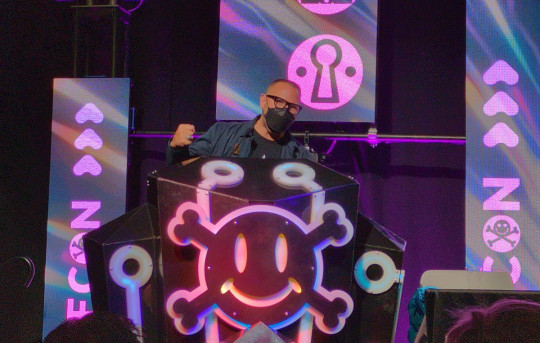
Community voting for SXSW is live! If you wanna hear RIDA QADRI and me talk about how GIG WORKERS can DISENSHITTIFY their jobs with INTEROPERABILITY, VOTE FOR THIS ONE!

If you'd like an essay-formatted version of this post to read or share, here's a link to it on pluralistic.net, my surveillance-free, ad-free, tracker-free blog:
https://pluralistic.net/2024/08/17/hack-the-planet/#how-about-a-nice-game-of-chess

Image: https://twitter.com/igama/status/1822347578094043435/ (cropped)
@[email protected] (cropped)
https://mamot.fr/@[email protected]/112963252835869648
CC BY 4.0 https://creativecommons.org/licenses/by/4.0/deed.pt
#pluralistic#defcon#defcon 32#hackers#enshittification#speeches#transcripts#disenshittify or die#Youtube
922 notes
·
View notes
Text
A summary of the Chinese AI situation, for the uninitiated.
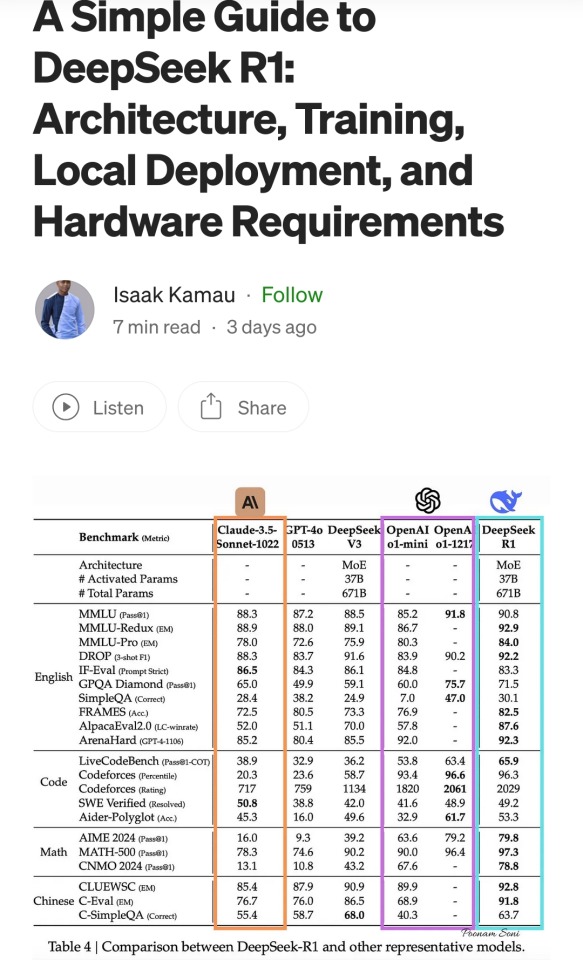
These are scores on different tests that are designed to see how accurate a Large Language Model is in different areas of knowledge. As you know, OpenAI is partners with Microsoft, so these are the scores for ChatGPT and Copilot. DeepSeek is the Chinese model that got released a week ago. The rest are open source models, which means everyone is free to use them as they please, including the average Tumblr user. You can run them from the servers of the companies that made them for a subscription, or you can download them to install locally on your own computer. However, the computer requirements so far are so high that only a few people currently have the machines at home required to run it.
Yes, this is why AI uses so much electricity. As with any technology, the early models are highly inefficient. Think how a Ford T needed a long chimney to get rid of a ton of black smoke, which was unused petrol. Over the next hundred years combustion engines have become much more efficient, but they still waste a lot of energy, which is why we need to move towards renewable electricity and sustainable battery technology. But that's a topic for another day.
As you can see from the scores, are around the same accuracy. These tests are in constant evolution as well: as soon as they start becoming obsolete, new ones are released to adjust for a more complicated benchmark. The new models are trained using different machine learning techniques, and in theory, the goal is to make them faster and more efficient so they can operate with less power, much like modern cars use way less energy and produce far less pollution than the Ford T.
However, computing power requirements kept scaling up, so you're either tied to the subscription or forced to pay for a latest gen PC, which is why NVIDIA, AMD, Intel and all the other chip companies were investing hard on much more powerful GPUs and NPUs. For now all we need to know about those is that they're expensive, use a lot of electricity, and are required to operate the bots at superhuman speed (literally, all those clickbait posts about how AI was secretly 150 Indian men in a trenchcoat were nonsense).
Because the chip companies have been working hard on making big, bulky, powerful chips with massive fans that are up to the task, their stock value was skyrocketing, and because of that, everyone started to use AI as a marketing trend. See, marketing people are not smart, and they don't understand computers. Furthermore, marketing people think you're stupid, and because of their biased frame of reference, they think you're two snores short of brain-dead. The entire point of their existence is to turn tall tales into capital. So they don't know or care about what AI is or what it's useful for. They just saw Number Go Up for the AI companies and decided "AI is a magic cow we can milk forever". Sometimes it's not even AI, they just use old software and rebrand it, much like convection ovens became air fryers.
Well, now we're up to date. So what did DepSeek release that did a 9/11 on NVIDIA stock prices and popped the AI bubble?
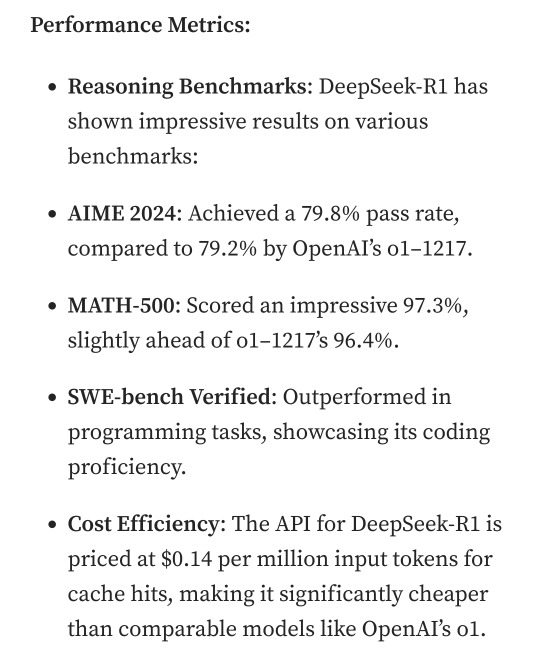
Oh, I would not want to be an OpenAI investor right now either. A token is basically one Unicode character (it's more complicated than that but you can google that on your own time). That cost means you could input the entire works of Stephen King for under a dollar. Yes, including electricity costs. DeepSeek has jumped from a Ford T to a Subaru in terms of pollution and water use.
The issue here is not only input cost, though; all that data needs to be available live, in the RAM; this is why you need powerful, expensive chips in order to-
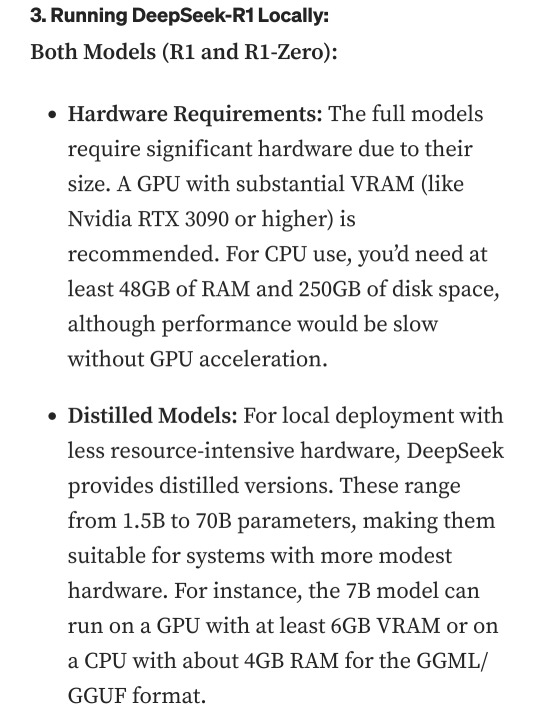
Holy shit.
I'm not going to detail all the numbers but I'm going to focus on the chip required: an RTX 3090. This is a gaming GPU that came out as the top of the line, the stuff South Korean LoL players buy…
Or they did, in September 2020. We're currently two generations ahead, on the RTX 5090.
What this is telling all those people who just sold their high-end gaming rig to be able to afford a machine that can run the latest ChatGPT locally, is that the person who bought it from them can run something basically just as powerful on their old one.
Which means that all those GPUs and NPUs that are being made, and all those deals Microsoft signed to have control of the AI market, have just lost a lot of their pulling power.
Well, I mean, the ChatGPT subscription is 20 bucks a month, surely the Chinese are charging a fortune for-
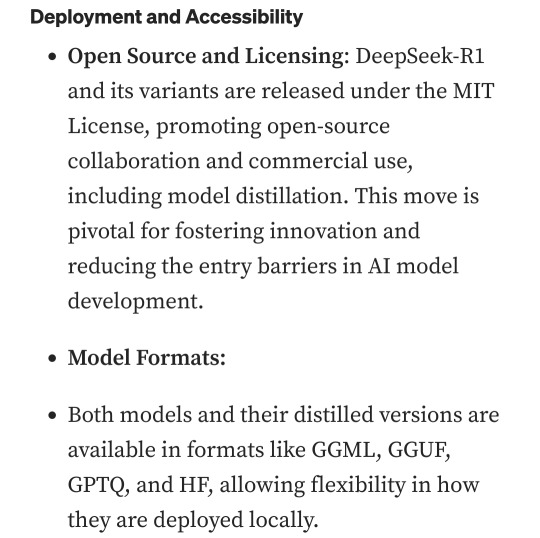
Oh. So it's free for everyone and you can use it or modify it however you want, no subscription, no unpayable electric bill, no handing Microsoft all of your private data, you can just run it on a relatively inexpensive PC. You could probably even run it on a phone in a couple years.
Oh, if only China had massive phone manufacturers that have a foot in the market everywhere except the US because the president had a tantrum eight years ago.
So… yeah, China just destabilised the global economy with a torrent file.
#valid ai criticism#ai#llms#DeepSeek#ai bubble#ChatGPT#google gemini#claude ai#this is gonna be the dotcom bubble again#hope you don't have stock on anything tech related#computer literacy#tech literacy
286 notes
·
View notes
Text
Have YOU got an old Windows PC Microsoft has told you can't run Windows 11? It's time to give it a new life!
How to install Windows 11 on unsupported PC Hardware using Rufus. You can also disable some other Windows 11 bullshit like data harvesting and needing a Microsoft account.
It has been in the news a lot lately that Windows 11 isn't allowed to be installed on PCs without certain requirements, including the TPM 2.0, a chip that was only included in PCs made in 2018 or later. This means that once Windows 10 stops receiving security updates, those PCs will not be able to (officially) run a safe, updated version of Windows anymore. This has led to an estimated 240 million PCs bound for the landfill. Thanks Microsoft! I get you don't want to be seen as the insecure one, but creating this much waste can't be the solution.
(I know nerds, Linux is a thing. I love you but we are not having that conversation. If you want to use Linux on an old PC you are already doing it and you don't need to tell me about it. People need Windows for all sorts of reasons that Linux won't cut.)
So lately I have been helping some under privileged teens get set up with PCs. Their school was giving away their old lab computers, and these kids would usually have no chance to afford even a basic computer. They had their hard drives pulled so I have been setting them up with SSDs, but the question was, what to do about the operating system? So I looked into it and I found out there IS actually a way to bypass Microsoft's system requirement and put Windows 11 on PCs as old as 2010.
You will need: Rufus: An open source ISO burning tool.
A Windows 11 ISO: Available from Microsoft.
A USB Flash Drive, at least 16GB.
A working PC to make the ISO, and a PC from 2018 or older you want to install Windows 11 on.
Here is the guide I used, but I will put it in my own words as well.
Download your Windows 11 ISO, and plug in your USB drive. It will be erased, so don't have anything valuable on it. Run Rufus, select your USB drive in the Device window, and select your Windows 11 ISO with the Select button. (There is supposed to be a feature in Rufus to download your ISO but I couldn't get it to work.?
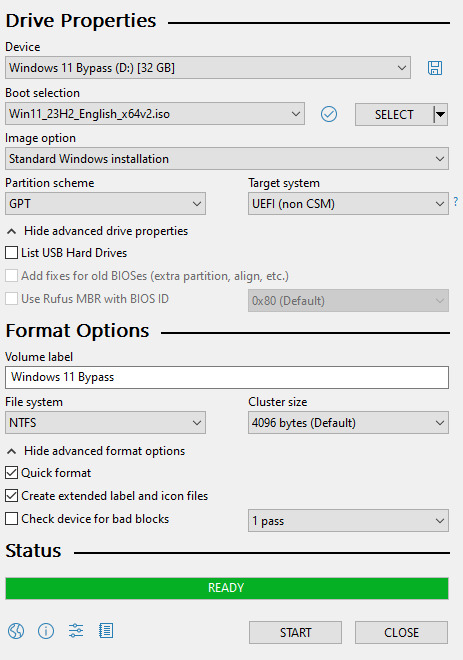
Choose standard windows installation, and follow the screenshot for your settings. Once you are done that, press Start, and then the magic happens. Another window pops up allowing you to remove the system requirements, the need for a microsoft account, and turn off data collecting. Just click the options you want, and press ok to write your iso to a drive.
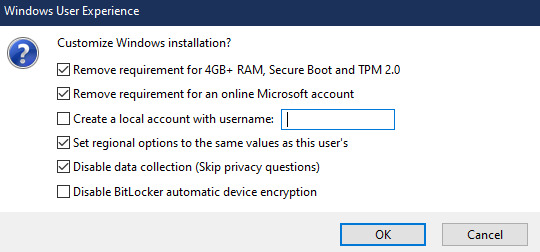
From there you just need to use the USB drive to install windows. I won't go into details here, but here are some resources if you don't know how to do it.
Boot your PC from a USB Drive
Install Windows 11 from USB Drive
If you had a licensed copy of Windows 10, Windows 11 will already be licensed. If you don't, then perhaps you can use some kind of... Activation Scripts for Microsoft software, that will allow you to activate them. Of course I cannot link such tools here. So there you go, now you can save a PC made from before 2018 from the landfill, and maybe give it to a deserving teen in the process. The more we can extend the lives of technology and keep it out of the trash, the better.
Additional note: This removes the requirement for having 4GB Minimum of RAM, but I think that requirement should honestly be higher. Windows 11 will be unusable slow on any system with below 8GB of RAM. 8GB is the minimum I think you should have before trying this but it still really not enough for modern use outside of light web and office work. I wouldn't recommend trying this on anything with 4GB or less. I am honestly shocked they are still selling brand new Windows 11 PCs with 4GB of ram. If you're not sure how much RAM you have, you can find out in the performance tab of Task Manager in Windows, if you click the More Details icon on the bottom right. If you don't have enough, RAM for old systems is super cheap and widely available so it would definitely be worth upgrading if you have a ram starved machine you'd like to give a new life.
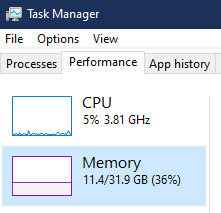
#Windows#Windows 11#tech#tech advice#pc#TPM 2.0#rufus#open source#open source software#technology#tech tips
704 notes
·
View notes
Text
One thing I noticed talking about Linux and free software is that a lot of people seem afraid of learning things about technology. I constantly read things like "I hate windows, but switching to linux would mean learning a new OS, and you have to be some super-smart programmer-hacker to do that." Or even: "Switching to firefox would mean switching browsers and I don't know how"
And that is precisely the attitude tech companies like Microsoft and Apple try to instill in their users in order to control them. They create these simple and “friendly” user interfaces for their products, but these hide information. From their OS being pre-installed to their settings apps, they keep people from learning things about how their computer works, and letting the companies make the decisions for their users.
I think people are underestimating themselves and overestimating how hard it is to learn new things are. It is like Windows/Macos have taught them some kind of technological learned helplessness. Not knowing how computers work and being afraid to learn how is how companies like Microsoft controls you, and justifies that control.
For example, people hate the forced and automatic system updates on Windows. And Microsoft justifies it as necessary because some people don’t know that their computer needs security updates and therefore don’t update, so they have to force the updates on them. That’s definitely true, and Microsoft’s tech support people is definitely very aware of that but it is a operating system that presumes that the user is incompetent and therefore shouldn’t control their own computer. And of course Microsoft abuses that power to force privacy-invading features on their users. Windows updates are also badly designed in comparison, no Linux distro I’ve used required the update program to hijack the entire computer, preventing the user from doing other things, but Windows does.
This is the dark side of “user-friendly” design. By requiring zero knowledge and zero responsibility for the user, they also take control away from the user. User-friendly graphical user interfaces (GUI) can also hide the inner workings of a system in comparison to the command line, which enables more precise control of your computer and give you more knowledge about what it is doing.
Even GUIs are not all made equal in regards to this, as the comparison between the Windows Control panel and their newer Settings app demonstrates. As I complained about before, Windows have hidden away the powerful, but complex Control Panel in favor of the slicker-looking but simplified and less powerful Settings app for over a decade now.
Of course this is a sliding scale, and there is a sensible middle-ground between using the command line for everything and user-friendly design masking taking control away from the end user.
There are Linux distros like Linux Mint and MX Linux who have created their own GUI apps for tasks that would otherwise use the command line, without taking control away from the user. This is mainly because they are open source non-profit community-driven distros, instead of being proprietary OSes made by profit-driven megacorps.
Still, giving that control to the user presumes some knowledge and responsibility on part of the user. To return to the update example, by default both Mint and MX will search and notify you of available updates, but you will have to take the decision to download and install them. Automatic updates are available in both cases, but it’s opt-in, you have to enable that option yourself. And that approach presumes that you know that you should update your system to plug security holes, something not all people do. It gives you control because it presumes you have knowledge and can take responsibility for those decisions.
All this also applies to the underlying fact that practically all pre-built computers nowadays have an operating system pre-installed. Few people install an OS themselves nowadays, instead they use whatever came with the computer. It’s usually either Windows or MacOS for desktops/laptops, and Android/IOS for smartphones (which are also a type of computer).
Now all this is very convenient and user-friendly, since it means you don’t have to learn how to install your own operating system. The OEM takes care of that for you. But again, this is a convenience that takes choice away from you. If you don’t learn how to install your own OS, you are stuck with whatever that is on the computer you bought. It’s probably precisely this step that scares people away from Linux, few people have installed even Windows, and installing your own OS seems impossibly scary. But again, learning is the only way to take back control. If you learn how to install an OS off an USB stick, you now have choices in what OS to use. (Sidenote: the hard part IMO is not the actual install process, but fiddling with the BIOS so it will actually boot from the distro on the USB stick. This old comic strip illustrates this very well).
That’s how life is in general, not just computers. Having control over your life means making decisions based on your own judgment. And to make sensible, rational decisions, you have to learn things, acquire knowledge.
The only other alternative is letting others take those decisions for you. You don’t have to learn anything, but you have no control. And in the tech world, that means big corporations like Microsoft, Google and Apple will make those decisions, and they are motivated by their own profits, not your well-being.
Computers have only become more and more capable and more important in our lives, and that can enable wonderful things. But it also means more power to the tech companies, more power over our lives. And the only way to resist that is to learn about computers, to enable us to make our own decisions about how we use technology.
845 notes
·
View notes
Note
Hello! First, I wanted to say thank you for your post about updating software and such. I really appreciated your perspective as someone with ADHD. The way you described your experiences with software frustration was IDENTICAL to my experience, so your post made a lot of sense to me.
Second, (and I hope my question isn't bothering you lol) would you mind explaining why it's important to update/adopt the new software? Like, why isn't there an option that doesn't involve constantly adopting new things? I understand why they'd need to fix stuff like functional bugs/make it compatible with new tech, but is it really necessary to change the user side of things as well?
Sorry if those are stupid questions or they're A Lot for a tumblr rando to ask, I'd just really like to understand because I think it would make it easier to get myself to adopt new stuff if I understand why it's necessary, and the other folks I know that know about computers don't really seem to understand the experience.
Thank you so much again for sharing your wisdom!!
A huge part of it is changing technologies and changing norms; I brought up Windows 8 in that other post and Win8 is a *great* example of user experience changing to match hardware, just in a situation that was an enormous mismatch with the market.
Win8's much-beloathed tiles came about because Microsoft seemed to be anticipating a massive pivot to tablet PCs in nearly all applications. The welcome screen was designed to be friendly to people who were using handheld touchscreens who could tap through various options, and it was meant to require more scrolling and less use of a keyboard.
But most people who the operating system went out to *didn't* have touchscreen tablets or laptops, they had a desktop computer with a mouse and a keyboard.
When that was released, it was Microsoft attempting to keep up with (or anticipate) market trends - they wanted something that was like "the iPad for Microsoft" so Windows 8 was meant to go with Microsoft Surface tablets.
We spent the first month of Win8's launch making it look like Windows 7 for our customers.
You can see the same thing with the centered taskbar on Windows 11; that's very clearly supposed to mimic the dock on apple computers (only you can't pin it anywhere but the bottom of the screen, which sucks).
Some of the visual changes are just trends and various companies trying to keep up with one another.
With software like Adobe I think it's probably based on customer data. The tool layout and the menu dropdowns are likely based on what people are actually looking for, and change based on what other tools people are using. That's likely true for most programs you use - the menu bar at the top of the screen in Word is populated with the options that people use the most; if a function you used to click on all the time is now buried, there's a possibility that people use it less these days for any number of reasons. (I'm currently being driven mildly insane by Teams moving the "attach file" button under a "more" menu instead of as an icon next to the "send message" button, and what this tells me is either that more users are putting emojis in their messages than attachments, or microsoft WANTS people to put more emojis than messages in their attachments).
But focusing on the operating system, since that's the big one:
The thing about OSs is that you interact with them so frequently that any little change seems massive and you get REALLY frustrated when you have to deal with that, but version-to-version most OSs don't change all that much visually and they also don't get released all that frequently. I've been working with windows machines for twelve years and in that time the only OSs that Microsoft has released were 8, 10, and 11. That's only about one OS every four years, which just is not that many. There was a big visual change in the interface between 7 and 8 (and 8 and 8.1, which is more of a 'panicked backing away' than a full release), but otherwise, realistically, Windows 11 still looks a lot like XP.
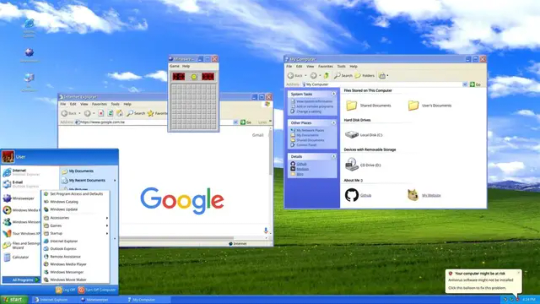

The second one is a screenshot of my actual computer. The only change I've made to the display is to pin the taskbar to the left side instead of keeping it centered and to fuck around a bit with the colors in the display customization. I haven't added any plugins or tools to get it to look different.
This is actually a pretty good demonstration of things changing based on user behavior too - XP didn't come with a search field in the task bar or the start menu, but later versions of Windows OSs did, because users had gotten used to searching things more in their phones and browsers, so then they learned to search things on their computers.
There are definitely nefarious reasons that software manufacturers change their interfaces. Microsoft has included ads in home versions of their OS and pushed searches through the Microsoft store since Windows 10, as one example. That's shitty and I think it's worthwhile to find the time to shut that down (and to kill various assistants and background tools and stop a lot of stuff that runs at startup).
But if you didn't have any changes, you wouldn't have any changes. I think it's handy to have a search field in the taskbar. I find "settings" (which is newer than control panel) easier to navigate than "control panel." Some of the stuff that got added over time is *good* from a user perspective - you can see that there's a little stopwatch pinned at the bottom of my screen; that's a tool I use daily that wasn't included in previous versions of the OS. I'm glad it got added, even if I'm kind of bummed that my Windows OS doesn't come with Spider Solitaire anymore.
One thing that's helpful to think about when considering software is that nobody *wants* to make clunky, unusable software. People want their software to run well, with few problems, and they want users to like it so that they don't call corporate and kick up a fuss.
When you see these kinds of changes to the user experience, it often reflects something that *you* may not want, but that is desirable to a *LOT* of other people. The primary example I can think of here is trackpad scrolling direction; at some point it became common for trackpads to scroll in the opposite direction that they used to; now the default direction is the one that feels wrong to me, because I grew up scrolling with a mouse, not a screen. People who grew up scrolling on a screen seem to feel that the new direction is a lot more intuitive, so it's the default. Thankfully, that's a setting that's easy to change, so it's a change that I make every time I come across it, but the change was made for a sensible reason, even if that reason was opaque to me at the time I stumbled across it and continues to irritate me to this day.
I don't know. I don't want to defend Windows all that much here because I fucking hate Microsoft and definitely prefer using Linux when I'm not at work or using programs that I don't have on Linux. But the thing is that you'll see changes with Linux releases as well.
I wouldn't mind finding a tool that made my desktop look 100% like Windows 95, that would be fun. But we'd probably all be really frustrated if there hadn't been any interface improvements changes since MS-DOS (and people have DEFINITELY been complaining about UX changes at least since then).
Like, I talk about this in terms of backward compatibility sometimes. A lot of people are frustrated that their old computers can't run new software well, and that new computers use so many resources. But the flipside of that is that pretty much nobody wants mobile internet to work the way that it did in 2004 or computers to act the way they did in 1984.
Like. People don't think about it much these days but the "windows" of the Windows Operating system represented a massive change to how people interacted with their computers that plenty of people hated and found unintuitive.
(also take some time to think about the little changes that have happened that you've appreciated or maybe didn't even notice. I used to hate the squiggly line under misspelled words but now I see the utility. Predictive text seems like new technology to me but it's really handy for a lot of people. Right clicking is a UX innovation. Sometimes you have to take the centered task bar in exchange for the built-in timer deck; sometimes you have to lose color-coded files in exchange for a right click.)
294 notes
·
View notes
Text
youtube
this might already be common knowledge but i only just found out so if you, like me, are a little clown idiot who is still paying for 365 when free open source alternatives exist (i'm so sorry openoffice i just can't figure out your spreadsheets): microsoft is trying this cool new thing called Lying To You ✨️
the tl;dr of rhe video above is that if you use m365 personal, you probably received an email about a price uptick

"so what's the added value/what are the new innovations," asked no one, because everyone knows they're talking about AI. what microsoft tries really hard to NOT tell you is that this isn't really a price change to your plan. they're upgrading you to a new plan that includes copilot, their AI chatbot that apparently not enough people are voluntarily deciding to pay for so they'll just forcibly shove it down your throat instead
if you read between the lines really really hard (and i wouldn't have figured it out without the video above) they'll let you opt out - in a very counterintuitive way:

so yeah. to change your subscription (read: keep your current subscription instead of the upgrade microsoft is forcing on you) you have to tell them you want to cancel your subscription, after which they'll give you the option to "downgrade" (aka keep access to everything you already had but without the AI Slop Machine). it'll show you these options:


you can then "switch" to the cheaper subscription that is the EXACT ONE YOU ALREADY HAD
obviously the best option (and i'm assuming the one that a lot of people here that are smarter than me are already using) is to use literally any other software because there is a lot of good open source stuff out there. but unfortunately my beautiful girlfriend microsoft excel has my figurative balls in a vice so i just pay up like a fool, but at least they didn't get me with this bs
96 notes
·
View notes
Text
How to Deal with Windows 10/11 Nonsense
This is more for my own reference to keep all of this on one post. But hopefully others will find this useful too! So yeah, as the title says, this is a to organize links and resources related to handling/removing nonsense from Windows 10 and Windows 11. Especially bloatware and stuff like that Copilot AI thing.
First and foremost, there's O&O Software's ShutUp10++ (an antispy tool that help give you more control over Windows settings) and App Buster (helps remove bloatware and manage applications). I've used these myself for Windows 10 and they work great, and the developers have stated that these should work with Windows 11 too!
10AppsManager is another bloatware/app management tool, though at the moment it seems to only work on Windows 10.
Winaero Tweaker, similar to ShupUp10++ in that it gives you more control over Windows to disable some of the more annoying settings, such as disabling web search from the taskbar/start menu and disabling ads/tips/suggestions in different parts of the OS. I think ShupUp10++ covers the same options as this one, but I'm not entirely sure.
OpenShell, helps simplify the Start Menu and make it look more like the classic start menu from older versions of Windows. Should work with both 10 and 11 according to the readme.
Notes on how to remove that one horrible AI spying snapshots feature that's being rolled out on Windows 11 right now.
Article on how to remove Copilot (an AI assistant) from Windows 11. (Edit 11/20/2024) Plus a post with notes on how to remove it from Windows 10 too, since apparently it's not just limited to 11 now.
Win11Debloat, a simple script that can be used to automatically remove pretty much all of the bullshit from both 10 and 11, though a lot of its features are focused on fixing Windows 11 in particular (hence the name). Also has options you can set to pick and choose what changes you want!
Article on how to set up Windows 11 with a local account on a new computer, instead of having to log in with a Microsoft account. To me, this is especially important because I much prefer having a local account than let Microsoft have access to my stuff via a cloud account. Also note this article and this article for more or less the same process.
I will add to this as I find more resources. I'm hoping to avoid Windows 11 for as long as possible, and I've already been used the O&O apps to keep Windows 10 trimmed down and controlled. But if all else fails and I have to use Windows 11 on a new computer, then I plan to be as prepared as possible.
Edit 11/1/2024: Two extra things I wanted to add onto here.
A recommended Linux distro for people who want to use Linux instead of Windows.
How to run a Windows app on Linux, using Wine. Note that this will not work for every app out there, though a lot of people out there are working on testing different apps and figuring out how to get them to work in Wine.
The main app I use to help with my art (specifically for 3D models to make references when I need it) is Windows only. If I could get it to work on Linux, it would give me no reason to use Windows outside of my work computer tbh (which is a company laptop anyways).
231 notes
·
View notes
Text
ever wonder why spotify/discord/teams desktop apps kind of suck?
i don't do a lot of long form posts but. I realized that so many people aren't aware that a lot of the enshittification of using computers in the past decade or so has a lot to do with embedded webapps becoming so frequently used instead of creating native programs. and boy do i have some thoughts about this.
for those who are not blessed/cursed with computers knowledge Basically most (graphical) programs used to be native programs (ever since we started widely using a graphical interface instead of just a text-based terminal). these are apps that feel like when you open up the settings on your computer, and one of the factors that make windows and mac programs look different (bc they use a different design language!) this was the standard for a long long time - your emails were served to you in a special email application like thunderbird or outlook, your documents were processed in something like microsoft word (again. On your own computer!). same goes for calendars, calculators, spreadsheets, and a whole bunch more - crucially, your computer didn't depend on the internet to do basic things, but being connected to the web was very much an appreciated luxury!
that leads us to the eventual rise of webapps that we are all so painfully familiar with today - gmail dot com/outlook, google docs, google/microsoft calendar, and so on. as html/css/js technology grew beyond just displaying text images and such, it became clear that it could be a lot more convenient to just run programs on some server somewhere, and serve the front end on a web interface for anyone to use. this is really very convenient!!!! it Also means a huge concentration of power (notice how suddenly google is one company providing you the SERVICE) - you're renting instead of owning. which means google is your landlord - the services you use every day are first and foremost means of hitting the year over year profit quota. its a pretty sweet deal to have a free email account in exchange for ads! email accounts used to be paid (simply because the provider had to store your emails somewhere. which takes up storage space which is physical hard drives), but now the standard as of hotmail/yahoo/gmail is to just provide a free service and shove ads in as much as you need to.
webapps can do a lot of things, but they didn't immediately replace software like skype or code editors or music players - software that requires more heavy system interaction or snappy audio/visual responses. in 2013, the electron framework came out - a way of packaging up a bundle of html/css/js into a neat little crossplatform application that could be downloaded and run like any other native application. there were significant upsides to this - web developers could suddenly use their webapp skills to build desktop applications that ran on any computer as long as it could support chrome*! the first applications to be built on electron were the late code editor atom (rest in peace), but soon a whole lot of companies took note! some notable contemporary applications that use electron, or a similar webapp-embedded-in-a-little-chrome as a base are:
microsoft teams
notion
vscode
discord
spotify
anyone! who has paid even a little bit of attention to their computer - especially when using older/budget computers - know just how much having chrome open can slow down your computer (firefox as well to a lesser extent. because its just built better <3)
whenever you have one of these programs open on your computer, it's running in a one-tab chrome browser. there is a whole extra chrome open just to run your discord. if you have discord, spotify, and notion open all at once, along with chrome itself, that's four chromes. needless to say, this uses a LOT of resources to deliver applications that are often much less polished and less integrated with the rest of the operating system. it also means that if you have no internet connection, sometimes the apps straight up do not work, since much of them rely heavily on being connected to their servers, where the heavy lifting is done.
taking this idea to the very furthest is the concept of chromebooks - dinky little laptops that were created to only run a web browser and webapps - simply a vessel to access the google dot com mothership. they have gotten better at running offline android/linux applications, but often the $200 chromebooks that are bought in bulk have almost no processing power of their own - why would you even need it? you have everything you could possibly need in the warm embrace of google!
all in all the average person in the modern age, using computers in the mainstream way, owns very little of their means of computing.
i started this post as a rant about the electron/webapp framework because i think that it sucks and it displaces proper programs. and now ive swiveled into getting pissed off at software services which is in honestly the core issue. and i think things can be better!!!!!!!!!!! but to think about better computing culture one has to imagine living outside of capitalism.
i'm not the one to try to explain permacomputing specifically because there's already wonderful literature ^ but if anything here interested you, read this!!!!!!!!!! there is a beautiful world where computers live for decades and do less but do it well. and you just own it. come frolic with me Okay ? :]
*when i say chrome i technically mean chromium. but functionally it's same thing
347 notes
·
View notes
Text
Ex-Meta employee Madelyn Machado recently posted a TikTok video claiming that she was getting paid $190,000 a year to do nothing. Another Meta employee, also on TikTok, posted that “Meta was hiring people so that other companies couldn’t have us, and then they were just kind of like hoarding us like Pokémon cards.” Over at Google, a company known to have pioneered the modern tech workplace, one designer complained of spending 40 percent of their time on “the inefficien[cy] overhead of simply working at Google.” Some report spending all day on tasks as simple as changing the color of a website button. Working the bare minimum while waiting for stock to vest is so common that Googlers call it “resting and vesting.” In an anonymous online poll on how many “focused hours of work” software engineers put in each day, 71 percent of the over four thousand respondents claimed to work six hours a day or less, while 12 percent said they did between one and two hours a day. During the acute phase of the Covid-19 pandemic, it became common for tech workers to capitalize on all this free time by juggling multiple full-time remote jobs. According to the Wall Street Journal, many workers who balance two jobs do not even hit a regular forty-hour workload for both jobs combined. One software engineer reported logging between three and ten hours of actual work per week when working one job, with the rest of his time spent on pointless meetings and pretending to be busy. My own experience supports this trend: toward the end of my five-year tenure as a software engineer for Microsoft, I was working fewer than three hours a day. And of what little code I produced for them, none of it made any real impact on Microsoft’s bottom line—or the world at large. For much of this century, optimism that technology would make the world a better place fueled the perception that Silicon Valley was the moral alternative to an extractive Wall Street—that it was possible to make money, not at the expense of society but in service of it. In other words, many who joined the industry did so precisely because they thought that their work would be useful. Yet what we’re now seeing is a lot of bullshit. If capitalism is supposed to be efficient and, guided by the invisible hand of the market, eliminate inefficiencies, how is it that the tech industry, the purported cradle of innovation, has become a redoubt of waste and unproductivity?
251 notes
·
View notes
Text
I'm going to a zine making workshop at the library and I am planning on making a zine about being nonbinary from a Buddhist perspective. Because in Buddhism there's this concept of "emptiness" that is basically summed up as "everything is made up of other smaller things and does not have a separate self without those things." And this can be applied to gender just like everything else, in the same sense that a lot of trans people will say gender is a "social construct."
First I am going to explain the difference between sex and gender using the analogy that people are like computers. They have hardware and software. Hardware on a computer is the physical pieces of the computer. The hard drive, the motherboard, the power supply or battery, etc. That's biological sex. Things like your primary and secondary sex characteristics, hormones, body parts, etc. The physical pieces of the person. That's sex. Just like swapping out RAM in a computer, you can change some of these things via medical intervention. Gender is the software, the programs you run on the hardware. In a computer it's things like google chrome, Microsoft word, safari, PowerPoint, etc. The way the computer thinks. That's gender.
I explain the emptiness of gender like "When I realized cis women felt like women I knew I was different. Because I never felt that. But when I started digging down to find what my 'one true gender deep down' was, I kept digging through layers and removing layer after layer. And some of these layers were big, like what society expects of people with my body type. And some were small, like the types of haircuts my mom likes to compliment. So I removed layers and removed layers until I got to the center of who I am and there was nothing there! It was empty! Gender is empty/a social construct made of layers of outside things."
This doesn't mean binary trans people are invalid because the way you relate to the layers does matter. But a lot of trans people, binary trans people included, have come to this "social construct/empty" conclusion.
I'm going to make the zine and give it to the monk who runs my temple because I want to come out there but I don't know how he'll take it because he's a bit conservative but not in the Christian way so idk what to expect.
92 notes
·
View notes
Text
On Personal InfoSec
Been awhile since I've had one of these posts but I figure with all that's going on in the world it's time to make another one of these posts and get some stuff out there for people. A lot of the information I'm going to go over you can find here:
So if you'd like to just click the link and ignore the rest of the post that's fine, I strongly recommend checking out the Privacy Guides.
Browsers:
There's a number to go with but for this post going forward I'm going to recommend Firefox. I know that the Privacy Guides lists Brave and Safari as possible options but Brave is Chrome based now and Safari has ties to Apple. Mullvad is also an option but that's for your more experienced users so I'll leave that up to them to work out.
Browser Extensions:
uBlock Origin: content blocker that blocks ads, trackers, and fingerprinting scripts. Notable for being the only ad blocker that still works on Youtube.
Privacy Badger: Content blocker that specifically blocks trackers and fingerprinting scripts. This one will catch things that uBlock doesn't catch but does not work for ads.
Facebook Container: "but I don't have facebook" you might say. Doesn't matter, Meta/Facebook still has trackers out there in EVERYTHING and this containerizes them off away from everything else.
Bitwarden: Password vaulting software, don't trust the password saving features of your browsers, this has multiple layers of security to prevent your passwords from being stolen.
ClearURLs: Allows you to copy and paste URL's without any trackers attached to them.
VPN:
Note: VPN software doesn't make you anonymous, no matter what your favorite youtuber tells you, but it does make it harder for your data to be tracked and it makes it less open for whatever network you're presently connected to.
Mozilla VPN: If you get the annual subscription it's ~$60/year and it comes with an extension that you can install into Firefox.
Proton VPN: Has easily the most amount of countries serviced, can take cash payments, and does offer port forwarding.
Email Provider:
Note: By now you've probably realized that Gmail, Outlook, and basically all of the major "free" e-mail service providers are scraping your e-mail data to use for ad data. There are more secure services that can get you away from that but if you'd like the same storage levels you have on Gmail/Outlook.com you'll need to pay.
Proton Mail: Secure, end-to-end encrypted, and fairly easy to setup and use. Offers a free option up to 1gb
Tuta: Secure, end-to-end encrypted, been around a very long time, and offers a free option up to 1gb.
Email Client:
Thunderbird if you're on Windows or Linux
Apple Mail if you're on macOS
Cloud Storage:
Proton Drive: Encrypted cloud storage from the same people as Proton Mail.
Tresorit: Encrypted cloud storage owned by the national postal service of Switzerland. Received MULTIPLE awards for their security stats.
Peergos: decentralized and open-source, allows for you to set up your own cloud storage, but will require a certain level of expertise.
Microsoft Office Replacements:
LibreOffice: free and open-source, updates regularly, and has the majority of the same functions as base level Microsoft Office.
OnlyOffice: cloud-based, free, and open source.
Chat Clients:
Note: As you've heard SMS and even WhatsApp and some other popular chat clients are basically open season right now. These are a couple of options to replace those.
Signal: Provides IM and calling securely and encrypted, has multiple layers of data hardening to prevent intrusion and exfil of data.
Molly (Android OS only): Alternative client to Signal. Routes communications through the TOR Network.
Briar: Encrypted IM client that connects to other clients through the TOR Network, can also chat via wifi or bluetooth.
Now for the last bit, I know that the majority of people are on Windows or macOS, but if you can get on Linux I would strongly recommend it. pop_OS, Ubuntu, and Mint are super easy distros to use and install. They all have very easy to follow instructions on how to install them on your PC and if you'd like to just test them out all you need is a thumb drive to boot off of to run in demo mode.
If you game through Steam their Proton emulator in compatibility mode works wonders, I'm presently playing a major studio game that released in 2024 with no Linux support on it and once I got my drivers installed it's looked great. There are some learning curves to get around, but the benefit of the Linux community is that there's always people out there willing to help.
I hope some of this information helps you and look out for yourself, it's starting to look scarier than normal out there.

#information security#infosec#computer security#computer infosec#personal infosec#browsers#internet browser#email#instant messaging#cloud storage#linux#pop os#linux mint#ubuntu#firefox#firefox extensions#long post
33 notes
·
View notes
Text
An adversarial iMessage client for Android
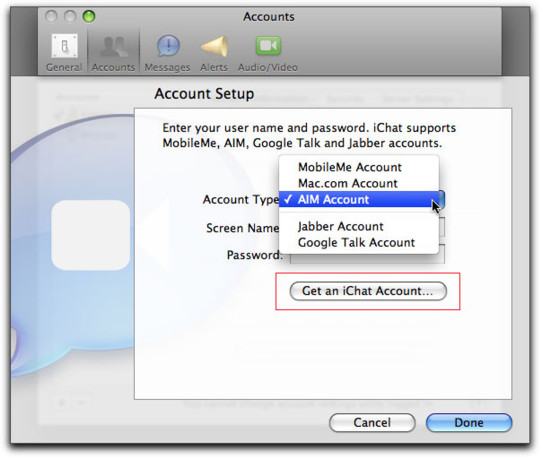
Adversarial interoperability is one of the most reliable ways to protect tech users from predatory corporations: that's when a technologist reverse-engineers an existing product to reconfigure or mod it (interoperability) in ways its users like, but which its manufacturer objects to (adversarial):
https://www.eff.org/deeplinks/2019/10/adversarial-interoperability
"Adversarial interop" is a mouthful, so at EFF, we coined the term "competitive compatibility," or comcom, which is a lot easier to say and to spell.
Scratch any tech success and you'll find a comcom story. After all, when a company turns its screws on its users, it's good business to offer an aftermarket mod that loosens them again. HP's $10,000/gallon inkjet ink is like a bat-signal for third-party ink companies. When Mercedes announces that it's going to sell you access to your car's accelerator pedal as a subscription service, that's like an engraved invitation to clever independent mechanics who'll charge you a single fee to permanently unlock that "feature":
https://www.techdirt.com/2023/12/05/carmakers-push-forward-with-plans-to-make-basic-features-subscription-services-despite-widespread-backlash/
Comcom saved giant tech companies like Apple. Microsoft tried to kill the Mac by rolling out a truly cursèd version of MS Office for MacOS. Mac users (5% of the market) who tried to send Word, Excel or Powerpoint files to Windows users (95% of the market) were stymied: their files wouldn't open, or they'd go corrupt. Tech managers like me started throwing the graphic designer's Mac and replacing it with a Windows box with a big graphics card and Windows versions of Adobe's tools.
Comcom saved Apple's bacon. Apple reverse-engineered MS's flagship software suite and made a comcom version, iWork, whose Pages, Numbers and Keynote could flawlessly read and write MS's Word, Excel and Powerpoint files:
https://www.eff.org/deeplinks/2019/06/adversarial-interoperability-reviving-elegant-weapon-more-civilized-age-slay
It's tempting to think of iWork as benefiting Apple users, and certainly the people who installed and used it benefited from it. But Windows users also benefited from iWork. The existence of iWork meant that Windows users could seamlessly collaborate on and share files with their Mac colleagues. IWork didn't just add a new feature to the Mac ("read and write files that originated with Windows users") – it also added a feature to Windows: "collaborate with Mac users."
Every pirate wants to be an admiral. Though comcom rescued Apple from a monopolist's sneaky attempt to drive it out of business, Apple – now a three trillion dollar company – has repeatedly attacked comcom when it was applied to Apple's products. When Apple did comcom, that was progress. When someone does comcom to Apple, that's piracy.
Apple has many tools at its disposal that Microsoft lacked in the early 2000s. Radical new interpretations of existing copyright, contract, patent and trademark law allows Apple – and other tech giants – to threaten rivals who engage in comcom with both criminal and civil penalties. That's right, you can go to prison for comcom these days. No wonder Jay Freeman calls this "felony contempt of business model":
https://pluralistic.net/2023/11/09/lead-me-not-into-temptation/#chamberlain
Take iMessage, Apple's end-to-end encrypted (E2EE) instant messaging tool. Apple customers can use iMessage to send each other private messages that can't be read or altered by third parties – not cops, not crooks, not even Apple. That's important, because when private messaging systems get hacked, bad things happen:
https://en.wikipedia.org/wiki/2014_celebrity_nude_photo_leak
But Apple has steadfastly refused to offer an iMessage app for non-Apple systems. If you're an Apple customer holding a sensitive discussion with an Android user, Apple refuses to offer you a tool to maintain your privacy. Those messages are sent "in the clear," over the 38-year-old SMS protocol, which is trivial to spy on and disrupt.
Apple sacrifices its users' security and integrity in the hopes that they will put pressure on their friends to move into Apple's walled garden. As CEO Tim Cook told a reporter: if you want to have secure communications with your mother, buy her an iPhone:
https://finance.yahoo.com/news/tim-cook-says-buy-mom-210347694.html
Last September, a 16-year old high school student calling himself JJTech published a technical teardown of iMessage, showing how any device could send and receive encrypted messages with iMessage users, even without an Apple ID:
https://jjtech.dev/reverse-engineering/imessage-explained/
JJTech even published code to do this, in an open source library called Pypush:
https://github.com/JJTech0130/pypush
In the weeks since, Beeper has been working to productize JJTech's code, and this week, they announced Beeper Mini, an Android-based iMessage client that is end-to-end encrypted:
https://beeper.notion.site/How-Beeper-Mini-Works-966cb11019f8444f90baa314d2f43a54
Beeper is known for a multiprotocol chat client built on Matrix, allowing you to manage several kinds of chat from a single app. These multiprotocol chats have been around forever. Indeed, iMessage started out as one – when it was called "iChat," it supported Google Talk and Jabber, another multiprotocol tool. Other tools like Pidgin have kept the flame alive for decades, and have millions of devoted users:
https://www.eff.org/deeplinks/2021/07/tower-babel-how-public-interest-internet-trying-save-messaging-and-banish-big
But iMessage support has remained elusive. Last month, Nothing launched Sunchoice, a disastrous attempt to bring iMessage to Android, which used Macs in a data-center to intercept and forward messages to Android users, breaking E2EE and introducing massive surveillance risks:
https://www.theverge.com/2023/11/21/23970740/sunbird-imessage-app-shut-down-privacy-nothing-chats-phone-2
Beeper Mini does not have these defects. The system encrypts and decrypts messages on the Android device itself, and directly communicates with Apple's servers. It gathers some telemetry for debugging, and this can be turned off in preferences. It sends a single SMS to Apple's servers during setup, which changes your device's bubble from green to blue, so that Apple users now correctly see your device as a secure endpoint for iMessage communications.
Beeper Mini is now available in Google Play:
https://play.google.com/store/apps/details?id=com.beeper.ima&hl=en_US
Now, this is a high-stakes business. Apple has a long history of threatening companies like Beeper over conduct like this. And Google has a long history deferring to those threats – as it did with OG App, a superior third-party Instagram app that it summarily yanked after Meta complained:
https://pluralistic.net/2023/02/05/battery-vampire/#drained
But while iMessage for Android is good for Android users, it's also very good for Apple customers, who can now get the privacy and security guarantees of iMessage for all their contacts, not just the ones who bought the same kind of phone as they did. The stakes for communications breaches have never been higher, and antitrust scrutiny on Big Tech companies has never been so intense.
Apple recently announced that it would add RCS support to iOS devices (RCS is a secure successor to SMS):
https://9to5mac.com/2023/11/16/apple-rcs-coming-to-iphone/
Early word from developers suggests that this support will have all kinds of boobytraps. That's par for the course with Apple, who love to announce splashy reversals of their worst policies – like their opposition to right to repair – while finding sneaky ways to go on abusing its customers:
https://pluralistic.net/2023/09/22/vin-locking/#thought-differently
The ball is in Apple's court, and, to a lesser extent, in Google's. As part of the mobile duopoly, Google has joined with Apple in facilitating the removal of comcom tools from its app store. But Google has also spent millions on an ad campaign shaming Apple for exposing its users to privacy risks when talking to Android users:
https://www.theverge.com/2023/9/21/23883609/google-rcs-message-apple-iphone-ipager-ad
While we all wait for the other shoe to drop, Android users can get set up on Beeper Mini, and technologists can kick the tires on its code libraries and privacy guarantees.

If you'd like an essay-formatted version of this post to read or share, here's a link to it on pluralistic.net, my surveillance-free, ad-free, tracker-free blog:
https://pluralistic.net/2023/12/07/blue-bubbles-for-all/#never-underestimate-the-determination-of-a-kid-who-is-time-rich-and-cash-poor
#pluralistic#multiprotocol#interoperability#adversarial interop#beeper#reverse engineering#blue bubbles#green bubbles#e2ee#end to end encrypted#messaging#jjtech#pypushbeeper mini#matrix#competitive compatibility#comcom
1K notes
·
View notes
Text
Alright. I'm making this post because I was unpleasantly surprised to find Microsoft had forcibly downloaded an """"ai assistant"""" onto my computer (called Copilot), and because finding a site that actually told me how to kill it for good -- in clear, truly step-by-step terms -- was way harder than it needed to be.
Preface: this is only relevant if you're running Windows 11.
Here is your target:

If you see this logo on your taskbar -- or... have Edge installed on Windows 11 -- you've got Copilot. You can't delete it on its own, Microsoft has integrated it into the OS as best they can. The most you can do is disable it (instructions for which are at the very end of this post).
So... to REALLY get rid of it you need to uninstall Microsoft Edge, because it's a part of/reliant on Edge. A lot of bells and whistles of Windows are also reliant on Edge, like widgets, but I never use those. I use my PC almost exclusively for gaming, and I don't want this slimy "ai" shit on my computer. I use Firefox anyway. Edge can go die as far as I'm concerned.
Here's the actual steps, copy-pasted from a website that took me way too long to find. It also really makes my browser chug for some reason, which is why I'm copy-pasting the whole thing. If you still want to look at the site itself, put it in reader view as fast as you can (link to site).
1.) Open Microsoft Edge, type "edge://settings/help" in the address bar, and then press Enter.
2.) Click "About Microsoft Edge" at the bottom of the left-hand pane. Copy the version number at the top of the screen, under Microsoft Edge.
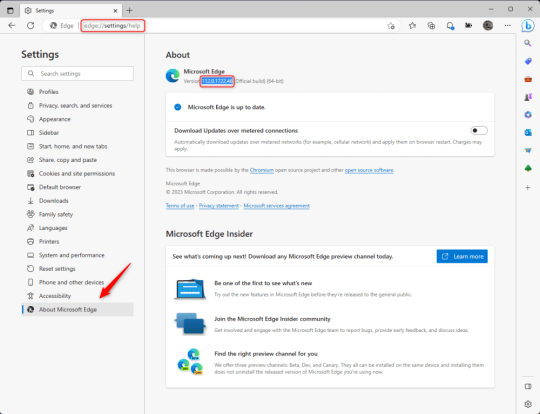
3.) Press Windows Key + S to open Windows Search.
4.) Type "Command Prompt", right-click the result, and then select "Run as Administrator".
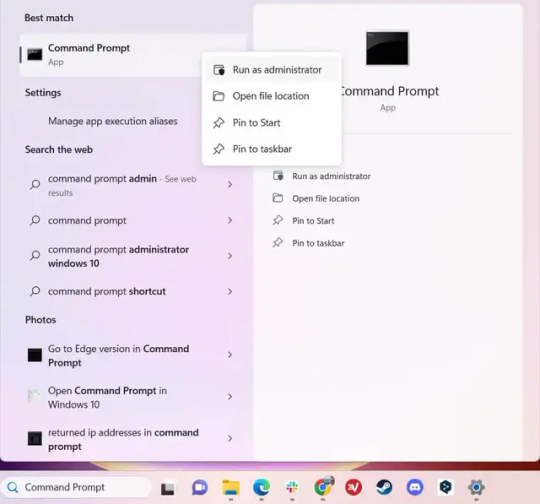
5.) The User Account Control (UAC) prompt will appear. Click "Yes".
6.) Navigate to Edge’s “Installer” directory by using the cd command. Depending on which directory your Command Prompt opens in by default, you may need to use the "cd .." command to go back a level or two.
Once ready, run this command:
cd “Program Files (x86)\Microsoft\Edge\Application\Version Number\Installer”
Replace "Version Number" with your actual version number copied earlier.
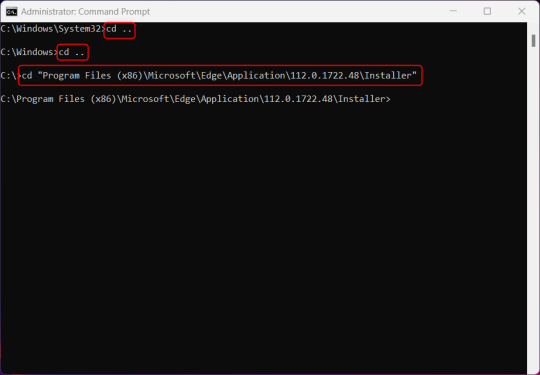
7.) Next, run this command to uninstall Microsoft Edge:
setup –uninstall –force-uninstall –system-level
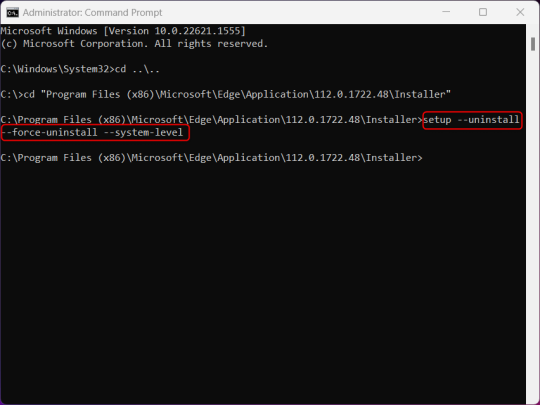
((It will look like nothing happened! Don't worry!))
8.) Restart your PC for the changes to take place.
((HOWEVER, Windows will try to reinstall it the next time your PC updates (or whenever it feels like it lol) so there's a second half to this))
1.) Press Windows Key + R to open Run.
2.) Type "regedit" in the text box and click OK to open the Registry Editor.
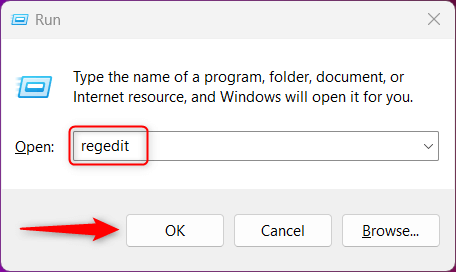
3.) The User Account Control (UAC) prompt will appear. Click "Yes".
4.) In the Registry Editor, navigate to HKEY_LOCAL_MACHINES\SOFTWARE\Microsoft.
5.) Right-click the "Microsoft" folder, hover your cursor over "New", and then select "Key".
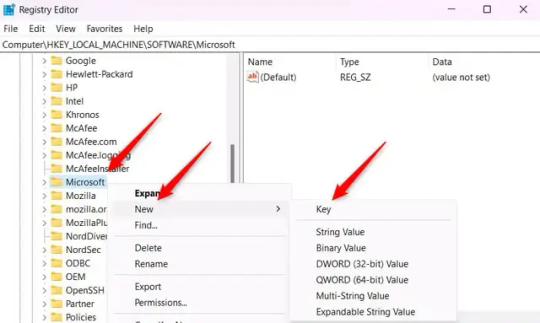
6.) Rename the new Key to "EdgeUpdate".
7.) Right-click EdgeUpdate, hover your cursor over "New", and then select "DWORD (32-bit) Value".
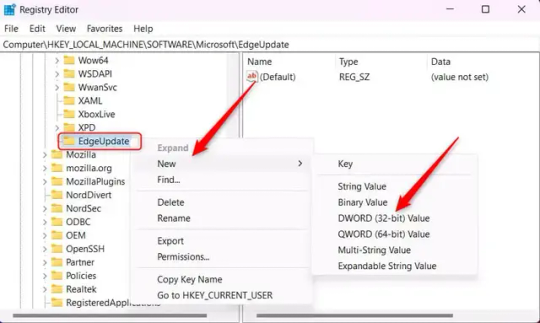
8.) Right-click the new value, which is currently named "New Value #1".
9.) Select "Rename" from the context menu.
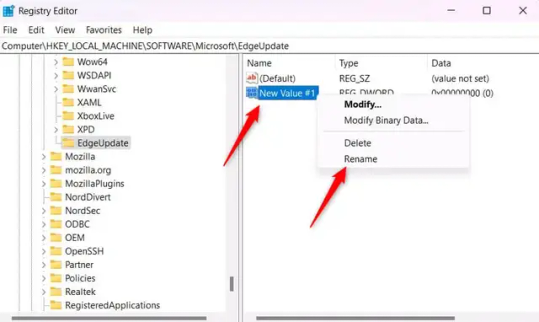
10.) Rename the value to "DoNotUpdateToEdgeWithChromium".
11.) Right-click the newly-named DoNotUpdateToEdgeWithChromium value and select "Modify" from the context menu.
12.) The Edit DWORD (32-bit) Value window will appear. Change the Value data to "1" and then click OK.

((You are now free. If you ever run into a really serious, unavoidable issue with your OS that's clearly a result of Edge being gone, you can redownload it like a regular app. But you should be fine.))
((And, if for some reason you want still want Edge around but just want the copilot thing gone, here's what you do:
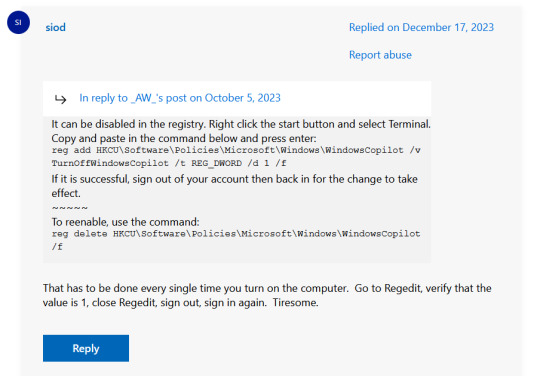
The command, for ease of copy-pasting: reg add HKCU\Software\Policies\Microsoft\Windows\WindowsCopilot /v TurnOffWindowsCopilot /t REG_DWORD /d 1 /f
You can't actually truly delete Copilot (without deleting Edge), only disable it. And as the reply says, you do have to do this every time you turn the computer on. I haven't tested that myself, but I believe it. I assume/hope that excludes just waking the computer up after it goes to sleep, but I don't know for sure.))
119 notes
·
View notes